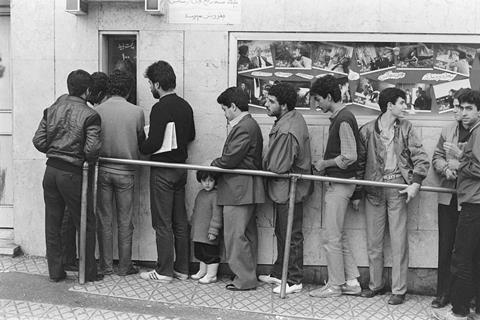Personal essay recalls a man who defied the authorities to preserve Iranian film after the revolution

Dir/scr: Ehsan Khoshbakht. UK/Iran. 2023. 80mins.
Iran, in the aftermath of the Islamic Revolution in 1979, was a dangerous place to be a cineaste. On the orders of the regime, movie theatres were shuttered, film prints destroyed and a once-thriving cinema culture stymied. But one man, Ahmad Jurghanian, fought back in the only way he knew how – by hiding thousands of reels of film in basement locations around Tehran to prevent their destruction. This lyrical and very personal essay from Ehsan Khoshbakht pays tribute to the late Jurghanian, the man who became his friend and his cinematic mentor.
A blend of authority, poetry and personal connection
The revolution has loomed large in the cultural landscape of Khoshbakht, the Iran-born, UK-based filmmaker, curator and author, who is also a co-director of Il Cinema Ritrovato in Bologna. His first feature documentary Filmfarsi (2019) explored the lost popular Iranian cinema of the Shah’s era; the picture was released in the US by Gunpowder/Criterion and screened widely at festivals around the world. This follow-up, which premieres at the London Film Festival, should prove to be catnip for programmers. The combination of the film’s deft and expressive use of archive material with Khoshbakht’s knowledge of and passion for his subject should make this an appealing title for cine-literate audiences at further festivals as well.
Thematically, there’s a kinship with David Redmon and Ashley Sabin’s recent documentary Kim’s Video, which traced the fate of a huge collection of pirated rare cinema, taped onto VHS and rented from the backroom of a launderette in downtown Manhattan. But tonally, the blend of authority, poetry and personal connection that Khoshbakht brings to the film calls to mind the work of Mark Cousins (who, in Bofa Productions, shares a production company with this picture).
Khoshbakht starts by tracing his own fascination with cinema. Born after the Islamic revolution, in a country that had already designated cinema as a ’machine of decadence’, he learned about movies from the plotlines his father recounted from memory in place of bedtime stories. Then, as a six-year-old, he was given a single frame of film, something which triggered a lifelong fascination with both cinema, and the physical act of projecting.
At the age of 17, Khoshbakht started organising film clubs, showing VHS videos of films taped from the television. It was only a matter of time before he became aware of Jurghanian, an elusive, almost mystical figure in Iranian underground cinema circles. As the initial post-revolutionary fervour died down somewhat, Jurghanian had started to lend out films from his immense collection, sending them to cinema clubs concealed in rice bags. Finally, the young Khoshbakht was granted an audience with Jurghanian – and he had the presence of mind and foresight to take a video camera.
The footage of Jurghanian’s home, its every room packed with piles of film canisters and boxes of publicity stills and posters, is remarkable. It had clearly been a long time since the apartment was a liveable space in the conventional sense of the word. It was, Khoshbakht admits, a dump. But it was also a trove of unquantifiable treasures. The door to the flat, chosen because it reminded Jurghanian of Alain Delon’s hideout in Le Samourai, is a portal to new worlds of cinema for the young Khoshbakht, and an introduction to the language of cinema that he uses fluently in this engrossing essay film.
There’s a bittersweet note to the picture, however, as Khoshbakht was prompted to make it following the news that Jurghanian had died unexpectedly. The fate of his collection is currently unknown. It may have been lost forever. But you sense that Khoshbakht will not rest until he knows for sure.
Production companies: Bofa Productions
Contact: Adam Dawtrey, adam.dawtrey@btinternet.com
Producers: Mary Bell, Adam Dawtrey
Cinematography: Garance Javelle
Editing: Niyaz Saghari
Music: Ekkehard Wölk
Main cast: Ehsan Khoshbakht, Ahmad Jurghanian















![[L-R]: Amanda Villavieja, Laia Casanovas, Yasmina Praderas](https://d1nslcd7m2225b.cloudfront.net/Pictures/274x183/6/4/1/1471641_pxl_20251224_103354743_618426_crop.jpg)








